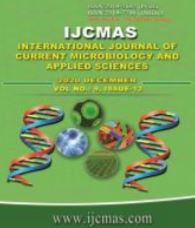


 National Academy of Agricultural Sciences (NAAS)
National Academy of Agricultural Sciences (NAAS)

|
PRINT ISSN : 2319-7692
Online ISSN : 2319-7706 Issues : 12 per year Publisher : Excellent Publishers Email : editorijcmas@gmail.com / submit@ijcmas.com Editor-in-chief: Dr.M.Prakash Index Copernicus ICV 2018: 95.39 NAAS RATING 2020: 5.38 |
The field experiment was conducted on the topic entitled Evaluation of eco-friendly approaches for the management of Pod borer on pigeonpea [Cajanus cajan (L.) millsp.]. The present investigations were conducted at Agriculture Research Farm of Institute of Agriculture Sciences, Banaras Hindu University, Varanasi, (U.P) India during Kharif 2018-19 and 2019-20. From the results it was concluded that Chlorantraniliprole 18.5 SC @ 30 g a.i/ha followed by Flubendiamide 480 SC@ 48 g a.i./ha is superior over all the eco-friendly treatments for all the insect pest. For pod borer Bt. Kurastaki was second most effective treatment with pod damage 3.66% and 4.67% and grain damage 2.05% and 2.88% in the year 2018-19 and 2019-20.. Therefore, on the basis of above facts regarding evaluation of eco-friendly approaches for the management of major insect pests on pigeonpea experiment, it is concluded that apart from chemical insecticides Azadirchtin and Bt. Kurastaki can be very effective for major pigeonpea pests reducing the damage to pods and grains. Azadirchtin also gave higher C: B ratio among all the bio-pesticides which also gave higher benefit compared to farmer’s practice. This may affect the socio- economical status of farmer with increased cost: benefit ratio. This information would be helpful to the regional farmers of Varanasi providing a higher income.
 |
 |
 |
 |
 |